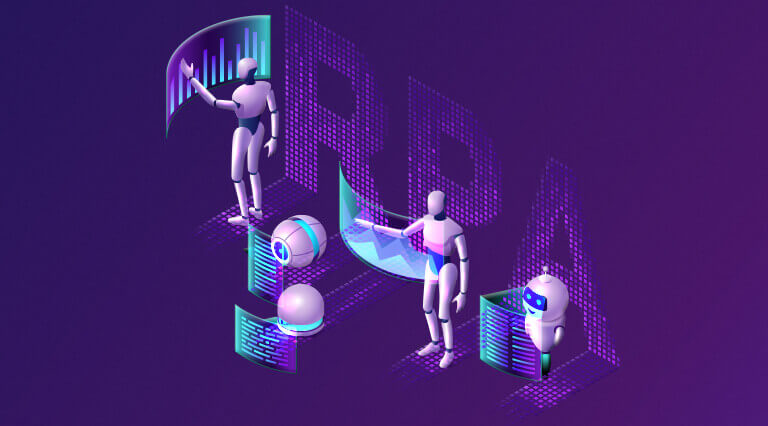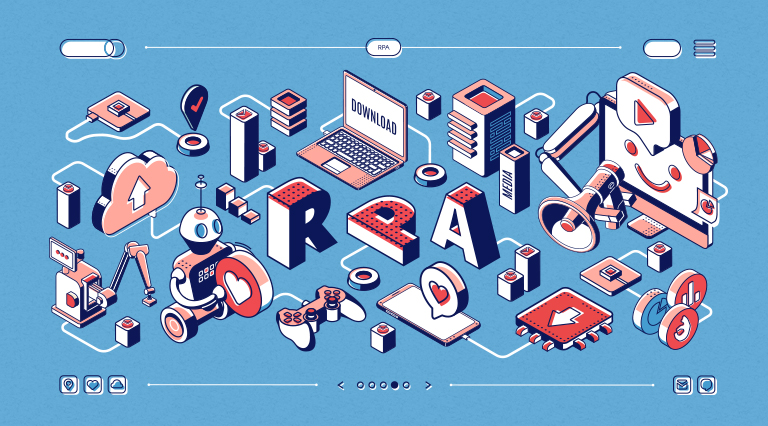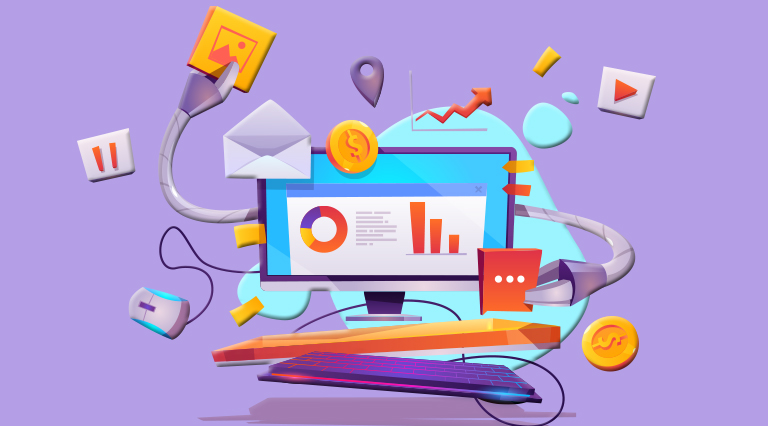
Robotic Process Automation (RPA) is a software technology that has been implemented in many business verticals to ease down the processes through automation of digital tasks. Many companies have adopted this technology to save time and money and to improve the overall performance of the company. The robotic process automation technology can do routine operations such as scraping data, form filling,
copy-paste activities, etc. In the RPA technique, bots or software robots are created to do business tasks by observing human digital actions.
Adopting RPA ensures error-free, non-stop and faster completion of tasks with utmost reliability and also assists in interacting with any application or system. Let’s analyze the various applications, tools, and benefits and the future of Robotic Process Automation technology.

Robotic Process Automation in Conventional Automation Terminology
Compared to traditional automation, RPA bots can do high volume repetitive tasks and interact with systems just like a human. The definition of RPA can be defined by the following key phrases.
Preconfigured software
They are specific software configurations with built-in processes and functionalities that can be modified based on the requirements of the customer.
Business logic
It is the application program where all the algorithms associated with the business logic perform behind-the-scenes data processing. Business logic is invisible to the user but is critical for the smooth sailing of business. Server applications are mainly business logic.
Predefined activity choreography
The predefined activity comprises a series of simple tasks such as updating reports, or complex ones across systems and applications.
Autonomous execution
The preconfigured software helps in the execution of tasks with the help of bots. The task will be done automatically, once the rules are predefined.
One or more unrelated software systems
The front-end applications of RPA have the capability to do tasks and interact as a human would. For example- SAP, Outlook, Oracle, Internet Explorer, etc.
Human exception management
On occasions, the unpredicted events or cognitive actions in the automated processes can be resolved easily with the involvement of employees. It could be a simple task like inputting data or handling a complete process.
Business Application of Robotic Process Automation
As per the studies, about 70–80% of the tasks are rule-based, thus can be done by implementing robotic process automation in various businesses. It also provides cost savings of up to 20 -30 %. RPA also contributes to greater employee engagement because it replaces humans in doing unskilled tasks offering them more productive time. Below mentioned are some of the specific industries where RPA is involved.

Banking sector
Banking sectors have a great demand for RPA to automate many lengthy processes. The operations include account opening and KYC, anti-money laundering, confirming appointments with customers, etc. The other application in the banking sector encompasses reconciliations, report generation, loan applications, and approval.
Insurance
In insurance, the RPA is much needed to tackle the repetitive processes and document-heavy workflows that make it well-suited for automation. It is used in major operations like policies or renewals, policy management, processes, regulatory compliance, underwriting, claims to process, and a lot more.
Healthcare
The operational challenges in the healthcare sector such as sensitive data, data storage issues, and strict procedures can be eliminated by adopting robotic process automation. RPA helps to streamline information management, updating electronic medical records, simplifying insurance claims processing, managing staffing levels, payment cycles, prescription management, and many more. It ensures the accuracy of all internal processes and provides accuracy, quality, compliance, and productivity.
Retail
The existing challenges in the retail industries are higher production cost, technology disruptions, unavailability of labour, etc. Thus retail companies are focusing more on RPA for fraud detection, warehouse and order management, customer feedback processing, and customer relationship management. RPA delivers accurate results and enhances the experience of both customers and employees in retail companies.
RPA use cases for other industries
Some of the industries with automated RPA are:
- Human resources
RPA is the best tool for management and standardization of much information and it helps with filling and capturing data, payroll, updating, processing of requests, etc.
- Finance and accounting
Incorporation of RPA gives better accuracy, speed, more efficiency, and reduces the costs. RPA helps in order management, vendor management, billing, accounting, incentive claims, and reconciliation.
- Procurement
Invoice processing, purchase order management, and contract management are the major applications of RPA in procurement.
Benefits of Robotic Process Automation
Robotic Process Automation eliminates the need for humans, improves the performance of the tasks to earn more business outcomes along with customer satisfaction due to the reduced call handling time (AHT), innovations, and scalability. It guarantees accelerated workflows with greater productivity by efficient execution of processes. Since all tasks are done with the help of robots, strict compliance standards, and 100% accuracy can be ensured. This is a boon for the healthcare and finance sectors. Robotic Process Automation also offers higher flexibility, cost-saving, and fast ROI, higher NPS (Net Promoter Score), and lower customer churn. Intelligent Automation is possible by integrating RPA with artificial intelligence that extends the magnitude of automation helps in automating non-standard vendor invoices, detecting potential fraud in finance sectors, etc.
Understanding the competitive RPA Landscape
The market has been crowded with automation and the landscape of robotic process automation has grown tremendously. There are a plethora of RPA tools and selecting one is quite a challenge. You must concentrate on the core issues to decide the RPA tool that aids you with the problems. Let’s focus on these characteristics:
• single-system architecture
• Built-in analytics
• AI capabilities
• Usability
• Customer service
• Training availability
Future Scope of Robotic Process Automation
The introduction of Robotic Process Automation has made a considerable shift in the overall business and is the fastest-growing software technology. In the future, more effective automation is attainable by integrating with artificial intelligence, optical character recognition (OCR), etc. Considering the recent trends of developments, let’s predict the future of RPA briefly.

Artificial Intelligence (AI) enhanced RPA
RPA is process-driven and AI is data-driven. Combining AI with RPA offers optimization of business processes that the robots can use AI to make decisions as they become a ‘thinking robot’.
Widespread adoption of automation
In spite of the cultural resistance to automation, many organizations are successfully implemented RPA to do repetitive tasks that can be performed more efficiently and precisely by software bots.
The convergence of human and digital technology
The convergence of the human workforce and technology scales new heights in efficiency. The creativity, speed, decision-making capabilities, social skills, etc. can be enhanced and the robots take on most of the tedious work to produce the best results.
Conclusion
The emergence of Robotic Process Automation (RPA) has grabbed a lot of attention in businesses leading to a wide digital transformation to make the internal processes more efficient, accurate, fast, and scalable. It reduces the burden of high volume mundane repetitive tasks on employees that saves time and operational costs. Adopting RPA changes the outlook of your business and if you are about to streamline and automate your business processes, start your automation program with Nextbrain Technologies!
